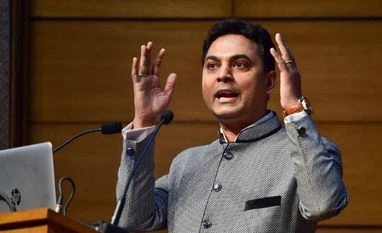India has some distance to go in fully shifting from the pro-crony to pro-business policies, Chief Economic Advisor Krishnamurthy Subramanian said on Saturday.
It will be pro-business policies that will enable the “invisible hands of the market” and also take the country to the $5-trillion gross domestic product (GDP) goal, he added.
“Pro-business policies are those that enable fair competition in the country. We have some distance to go in terms of enabling that fully. Pro-crony policies on the other hand just help incumbents and that is something that we have to stay away from in enabling the invisible hands of the market,” he said at an alumni conference of his alma mater, IIT-Kanpur.
Indian policymaking has been criticised for favouring crony capitalists in the initial decades after Independence, till the country shifted gears by adopting liberalisation in 1991.
Subramanian said after the Comptroller and Auditor General (CAG’s) report on telecom spectrum allocations came out in 2011, investor returns from “connected companies”, an euphemism for crony firms, had been very low as compared to the broader indices. The problem with cronyism is that it is not a better business model, he said, adding that we should always aim for “creative destruction” where incumbents were challenged.
In a critique of the dominant policy choices in the initial decades after Independence, he said “the tryst with socialism did not deliver the tryst with destiny”, referring to the first prime minister Jawaharlal Nehru’s famous speech when India attained freedom.
He also made a strong case for not depending only on recent work in economics to make policy choices and neglecting age-old texts like the Arthashastra.
More From This Section
“Scholarly work isn’t something that was written in the last 100 years, but dates back millennia,” he said. The Arthashastra stresses on ethical ways of creating wealth, he said, adding that we need to focus on creating trust in the markets as well. If governance standards have to be increased in the country, there has to be a greater focus on disclosing related-party transactions, the CEA said. The comments come in the wake of frauds like the one at non-banking lender DHFL. The Union Budget’s thrust on ‘Assemble in India’ should not be seen as substitute to the government’s flagship ‘Make in India’ programme, but as a complementary aspect which would act as a precursor to other goals, he said.
Pointing out to the recent Economic Survey, he said over 40 million well-paying jobs could be created in the country by 2025 by focusing on assembling for the world, and the same could go up to 80 million by 2030. Asked about the Budget’s thrust on imposing tariffs on certain sectors and how it has been criticised as being protectionist by some, Subramanian said we needed to make a distinction between duties that are imposed on finished products against those on raw materials or intermediate goods, which hurt exports.
)